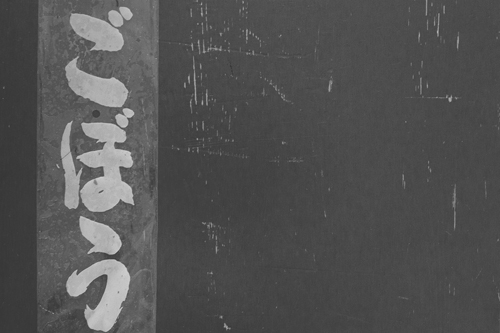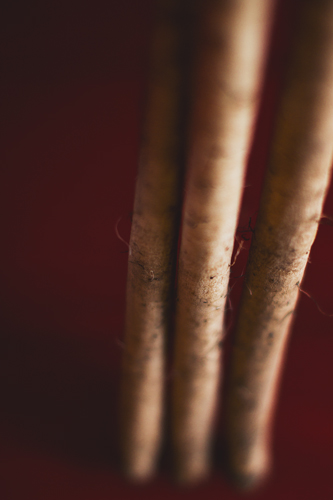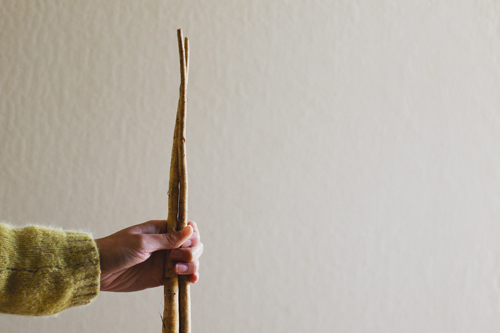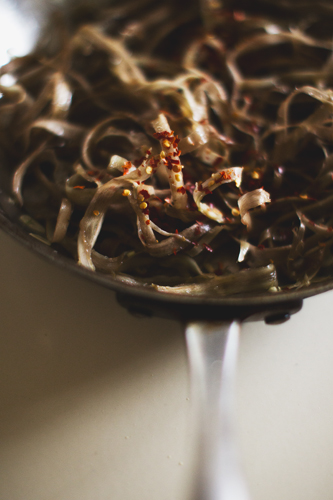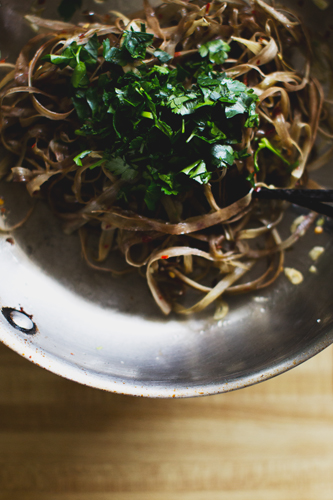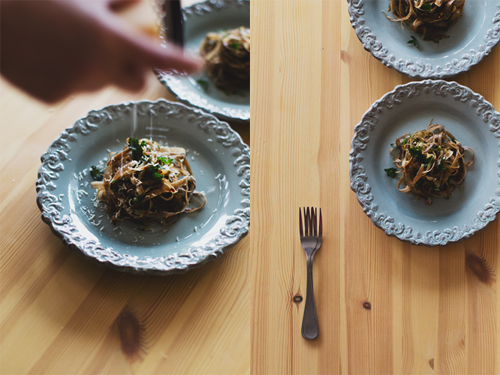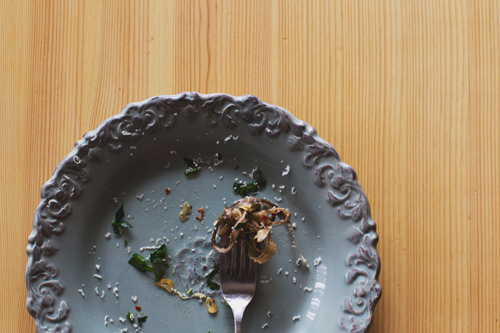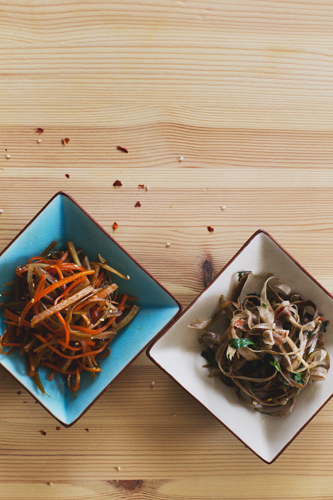Monday, February 20, 2012
Gobo Peperoncino and Kinpira Gobo
Sodden ground. Muddy man laying there. Things uninvented: couch, convenience. He's earned his rest.
What he lives is his own nature documentary. No camera save what he sees himself. The grasses are stiff, amber. Along the riparian the end of chirpy businesses. The birds have started their night songs. Grasses and plants of the riverbanks array before him, a collection of food stuffs, not quite a meal. Neither words such as meal and family have been invented, yet he knows of their substance. He harvests from the land when time and season permit, eats it then and there if fire is unneeded. There is no ritual, no prayer. The ritual is with the people he eats with, more than the time and place and even the food. Sometimes there is no food so the prayer goes out of his mouth and than into it. That is the origin of dinner.
His gather ranges from big to small, slim to fat, juicy to possibly poisonous. Toxins can numb the tongue and if you were brave or stupid or just too hungry to care maybe your stomach gets knotted and you stop caring about food or anything and you just want to die, quickly. He knows them by shape, by features like limbs and growths. We know them as cattail, leek, fennel, lotus root, other less strange tuber, maybe potato, maybe, cucumber. He needn’t say wild, for they are all wild. He is wild and the same.
I have seen a few wild cucumbers myself on the foothills of the Sierra Nevada. They are small and scraggly and hardly a bite. They are like miniature daikon and white on the outside with specks of dirt that cling stubbornly. There’s a slight bitterness at the end, a perfect hint of green. They might have grown next to the wild onion. There's a kind of onion that is not an onion but in fact poisonous. So that's something I haven't tried because I'm not brave or stupid enough or an expert in these matters.
What does it mean when others describe a food as earthy? They taste of the earth? Of dirt? Well, that's what I ate. Dirt. But is that not unclean and soiled? That's how you know organic from other kinds of produce at the market. They are dirty. If they're not, they're imperfect. Or bruised. Or maybe that's just a way of being just right. Or have weird spots that you wish was dirt. Maybe they're organisms small and dead that have cycled through the layers of the ground that carry all our feet, all that has ever been on our tiny spot of island. It is more than sensations on your tongue and the feeling in your mouth and the satisfaction in the gut. But it is a feeling like some unspeakable nostalgia pointing directly to the firmament. You begin to understand earthy when you eat a part of the world. It’s a feeling that the cells of living food tells you. And they become a part of you, and they impart a heavy wisdom, though they are just plant fibers fashioned from the soil and the light of the sun.
The man spreads the bunch at the end of his arrayed collection. They are longish roots, longer than the others, as tall as his son that passed away last autumn. The flowers are gone, no telling what they might have looked like, and the leaves, shriveled and missing any green if there was ever any green. For the cattails have all shed their dandelion tops, spreading far and away by the wind. He wants to bite in but he knows better. Firstly, you break the skin of the plant. You rub it in yours. You wait for hours, maybe a day or so. You then lick it. Then you wait again. Don't die of starvation yet. Eat what you know for now. Then you bite a tiny morsel. You spit. Are you alright? Are you numb? Are you dead yet? Now you will take the leap. But roots are hard and hardy. He should not eat them uncooked. They can be acrid and will spoil the stomach for many days even if they won't kill you outright. A man feels human with a fire he made himself and he should have a fire while there's still light to cook by and to stave the edge of darkness away and maybe things in the outer dark.
He slices the tall, muddy root that resembles a carrot. It is soaked in the ribs of a wicker basket, hanging off the side of the flat river boat. The trembling stream runs past. He wonders if it will taste like lotus root or the strange other tubers he has grown fond for. The hare has been cleaned and spitted. He licks his lips and waits, watching the crackling of the fire. At the edge he is a flat figure.
My father and I have also made discoveries at water’s edge. We walked the drying creeks of a small town-city. Thinking back, I’m not sure why we made these hikes. No good reason save no reason which is always the best reason. But maybe it was it to teach me? About things that can only be learned through walks. There were wild gooseberries that flourished on its outskirts. He snatched them from the tall stalks that could easily be dismissed for another weed, outstretched his open palms. “Eat it,” he said. He only said. It was no command to obey. But I did not hesitate. I chewed while we watched each other. I did not say anything more. Neither he. I cannot remember if they were tart or sweet, and in what proportions, only that they were tiny, perfectly green, different and delicious, and perhaps a bit sticky. I remember only not saying. How did my father know these things that primitive man had to discover for himself? The same way. Walks. Walks. And sharing. He was a brass laborer, with a sixth grade education from a developing country. He could not tell you what a star was, or why they were pinned against the background of night, or knew how to read a Britannica or botanical field guide. And what were we doing re-enacting these men long gone when lanterned gooseberries could be bought for decoration (but not for food) at the store.
It was the same for the inventor of food that put burdock into the vernacular. Acts of courage, acts of desperation, acts of kindness. Acts. Acts. Acts IV and V. Has it become a dead language, though, one called back into the lexicon for purposes of romance. I dare not say that only in Asia is burdock called food. Anthropologists say that even ancient Britons harvested burdock. Britons that ate it alongside acorn meal spread flat upon gray slabbed stones on top still hot ashes and still burning coals gray on the outside with a little fire showing in between the break. The green revolution has taught us to grow things that grow more, faster. What can burdock feed? No industry. It's a side-note in a portfolio of food owned by one company to attract shopping carts meant to be filled with meatier things. What is mushroom to a person? To a man before the advent of civilization, to a man with nothing but? To the vegan it is the meat. To the first forager a taste of earth of the earth that animals eat, man, the animals, too. I say, put mushroom and burdock together. And hell, meat if you want.
And when you eat it you will know the taste of dirt. You will remember those backyard mudpies when you thought it was a good idea to eat mud. Use your imagination here, too. Burdock tastes like burdock, just as gooseberries taste like gooseberries, and the other white meat tastes like whatever it happens to be and not actually chicken. It's very special dirt. Nuanced or too strong for the picky eater. Then too bland for others. Refined palettes need unrefining. Obscurity will inform your vocabulary. It’s something worth trying many times, like good art, until gotten. The reward is the gobo itself. Understanding is.
Story by HVH
labels: Italian, Japanese, Vegetarian
